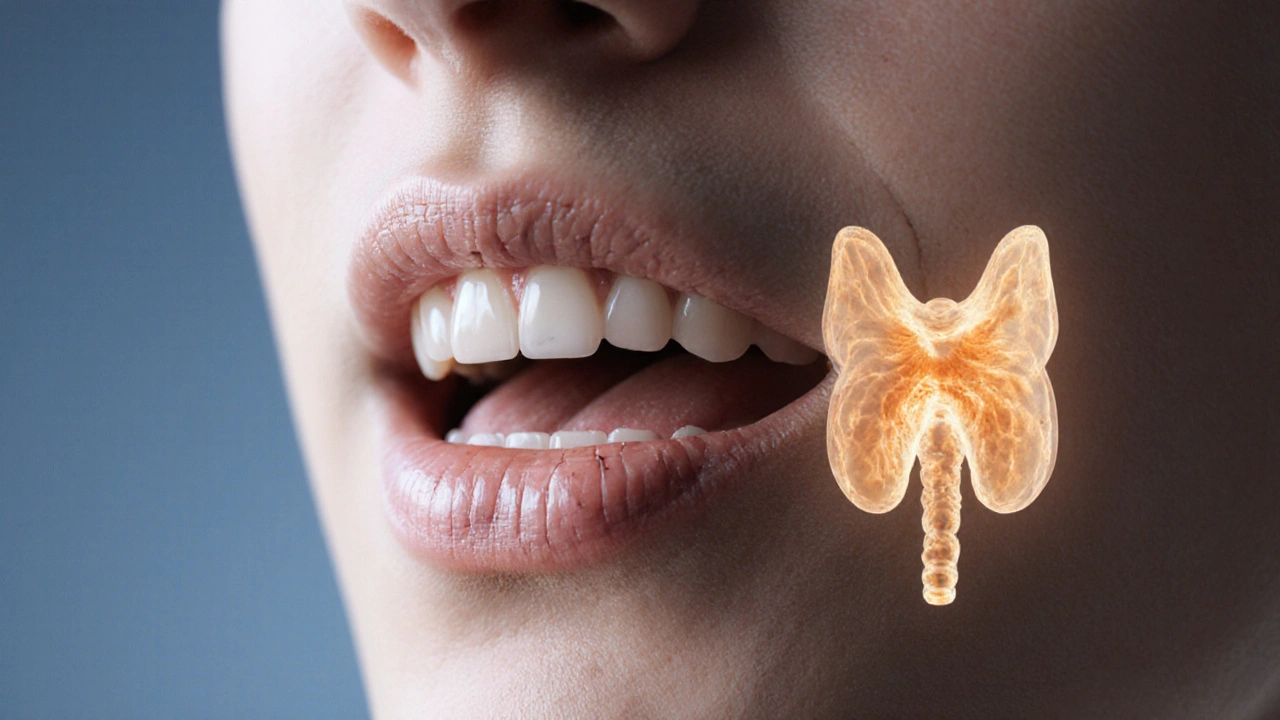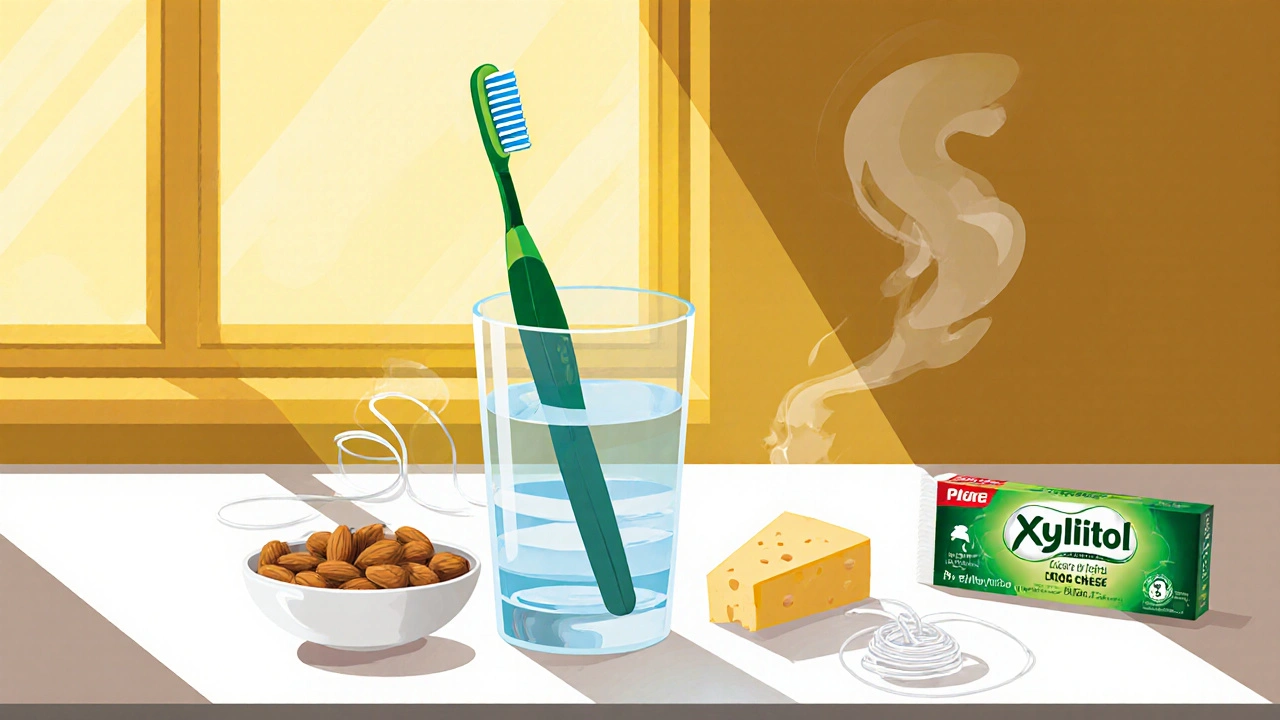Hyperthyroidism & Dental Health: Essential Tips for a Healthy Smile

Hyperthyroidism Hydration Calculator
Enter your details to calculate your personalized hydration plan.
Carry a water bottle - Keep a reusable bottle with you at all times to sip throughout the day.
Track your intake - Use a simple log or app to monitor your water consumption.
Hydrate before meals - Drink water before eating to help with saliva production.
Limit caffeine - Caffeine can contribute to dry mouth, which is already a concern with hyperthyroidism.
Use saliva-boosting products - Consider xylitol-based gum or saliva substitutes if dry mouth persists.
Key Takeaways
- Excess thyroid hormones can dry out your mouth, weaken enamel, and trigger gum problems.
- Staying hydrated, using fluoride products, and eating calcium‑rich foods help protect teeth.
- Regular dental check‑ups are critical, especially when you’re on antithyroid medication.
- Watch for signs like rapid tooth decay, sore gums, or a burning sensation on the tongue.
- Coordinate care between your dentist and endocrinologist for the best outcomes.
Living with hyperthyroidism means your body is running on a higher gear than normal. While most people focus on heart rate, weight loss, or anxiety, one hidden area often gets overlooked: your mouth. Below we break down how an overactive thyroid ties into oral health and give you practical steps to keep that smile bright.
Hyperthyroidism is a condition where the thyroid gland releases too much thyroid hormone, accelerating metabolism and affecting many organ systems. When metabolism speeds up, it can tug on the clockwork of saliva production, bone turnover, and gum tissue repair.
Dental health refers to the state of your teeth, gums, and supporting structures, all of which rely on a balanced internal environment to stay strong and resistant to decay.
How Thyroid Hormones Touch Your Mouth
Thyroid hormones-primarily T3 (triiodothyronine) and T4 (thyroxine)-play a starring role in calcium metabolism, bone remodeling, and the function of salivary glands.
Thyroid hormones T3 and T4 regulate the speed at which cells use energy, influencing bone density, muscle tone, and fluid balance. When levels soar, they can speed up bone turnover, sometimes leading to a subtle loss of mineral density in the jawbone.
Saliva, the mouth’s natural cleanser, is directly affected. High hormone levels may cause saliva production the amount of watery fluid secreted by the parotid, submandibular, and sublingual glands. Too little saliva means fewer minerals like calcium and phosphate reaching the tooth surface, and less flushing of food particles and acids.
Common Dental Issues Linked to Hyperthyroidism
Below is a quick snapshot of problems you’re more likely to see if you’re dealing with an overactive thyroid.
| Issue | Hyperthyroidism | General Population |
|---|---|---|
| Dry mouth (xerostomia) | 30‑45% experience noticeable dryness | ~10% occasional dryness |
| Enamel erosion | Higher due to reduced buffering | Lower, linked mostly to diet |
| Gum inflammation (gingivitis) | More frequent, especially with poor saliva | Typical rates around 20% |
| Accelerated tooth decay | Rapid cavities in high‑acid zones | Standard decay progression |
| Jawbone density loss | Potential early osteopenia | Usually age‑related |
Notice the pattern: less saliva, weaker enamel, and gums that can’t repair as quickly.

Everyday Oral‑Care Steps That Make a Difference
- Drink water frequently-aim for at least eight 8‑oz glasses a day. Carry a reusable bottle to sip during work or exercise.
- Swap regular mouthwash for an alcohol‑free, fluoride‑rich rinse. Alcohol can worsen dryness.
- Brush twice daily with a soft‑bristled toothbrush and a toothpaste containing 1,450ppm fluoride. If you notice increased sensitivity, ask your dentist about a high‑fluoride gel.
- Floss or use interdental brushes once a day to dislodge plaque that saliva can’t wash away.
- Chew sugar‑free gum (xylitol‑based) after meals. The chewing action stimulates the glands, boosting saliva flow.
- Include calcium‑rich snacks-cheese, yogurt, almonds-especially if your doctor says you have lowered bone density.
- Schedule dental cleanings every six months, or more often if you have persistent gum bleeding.
These habits counteract the main culprits: dehydration, low fluoride exposure, and insufficient plaque removal.
Nutrition and Lifestyle Tweaks for Stronger Teeth
What you eat influences both thyroid function and tooth health.
- Calcium metabolism The process by which the body absorbs, distributes, and utilizes calcium for bone and tooth formation. Aim for 1,000mg daily (1,200mg if you’re over 50). Dairy, leafy greens, and fortified plant milks are top sources.
- Limit acidic drinks (soda, citrus juices) that erode enamel, especially if saliva is already low.
- Include vitaminD (sunlight, fatty fish, supplements) to help calcium absorption.
- Stay away from excessive caffeine and alcohol, both of which can dry out the mouth.
Managing Medication Side Effects
Most people with hyperthyroidism take antithyroid drugs such as methimazole.
Methimazole An antithyroid medication that blocks thyroid hormone production, helping to normalize hormone levels. While effective, it can sometimes cause a dry mouth or taste changes.
If you notice these side effects:
- Talk to your endocrinologist about dosage adjustments.
- Increase water intake and use saliva‑boosting lozenges.
- Ask your dentist about a prescription‑strength fluoride rinse.

When to Seek Professional Help
Watch for warning signals that go beyond typical soreness.
- Persistent dry mouth lasting more than a few weeks.
- Bleeding gums or rapid gum recession.
- Sudden sensitivity to hot or cold foods.
- Visible pits or cracks in enamel that weren’t there before.
- Jaw pain that doesn’t improve with over‑the‑counter pain relievers.
If any of these appear, schedule a dental appointment promptly. Your dentist can assess saliva flow, check for early decay, and may recommend a saliva‑stimulating mouthpiece.
Putting It All Together: A Quick Daily Checklist
- Drink a glass of water within 30minutes of waking up.
- Brush with fluoride toothpaste; floss afterward.
- Carry sugar‑free gum for a post‑meal saliva boost.
- Take any prescribed antithyroid medication with a full glass of water.
- Eat a calcium‑rich snack before bedtime.
- Log any mouth changes in a small notebook to discuss at your next doctor or dentist visit.
Consistency beats intensity. Even a few minutes a day can offset the oral side effects of hyperthyroidism and keep your smile looking great.
Frequently Asked Questions
Can hyperthyroidism cause cavities even if I brush regularly?
Yes. Excess thyroid hormones can reduce saliva, the natural buffer that fights acid. Without enough saliva, plaque acids linger longer, increasing cavity risk despite good brushing habits.
Is there a specific toothbrush I should use?
A soft‑bristled, rounded‑tip brush is best. It cleans without irritating gums that may already be inflamed from dry mouth.
Do antithyroid drugs always cause dry mouth?
Not always, but many patients report it. The severity varies with dosage and individual sensitivity. Adjustments or saliva‑stimulating products can help.
How often should I see my dentist if I have hyperthyroidism?
Every six months is a good baseline, but if you notice dry mouth, gum bleeding, or rapid decay, schedule visits every three to four months.
Can diet alone improve my oral health while on medication?
Diet can dramatically help-hydration, calcium, vitaminD, and low‑acid foods support teeth and saliva. However, it works best alongside proper brushing, flossing, and professional care.

Dustin Richards
October 12, 2025 AT 16:30Thanks for the reminder to keep sipping water, it really helps my dry mouth.
Vivian Yeong
October 28, 2025 AT 13:06While the hydration tips are useful, the article could have emphasized the importance of regular dental check‑ups more strongly. Dry mouth alone isn’t the only risk factor for people with hyperthyroidism. A dentist familiar with endocrine disorders can tailor preventive measures. Also, mentioning specific fluoride treatments would have added depth.
suresh mishra
November 13, 2025 AT 10:42Staying hydrated is key, but don’t forget to brush twice a day with fluoride toothpaste.
Reynolds Boone
November 29, 2025 AT 08:18I love the water‑intake calculator; it turns a vague suggestion into a concrete goal. Just remember to spread the intake throughout the day, not all at once.
Angelina Wong
December 15, 2025 AT 05:54Keep a reusable bottle handy and track your sips – those small habits add up fast.
Anthony Burchell
December 31, 2025 AT 03:30Honestly, most people think drinking water alone will fix everything, but without proper oral hygiene you’re just masking the problem. It’s a bit dramatic to call it a miracle, but the synergy of water and brushing works.
Michelle Thibodeau
January 16, 2026 AT 01:06Dealing with hyperthyroidism can feel like a roller coaster for your whole body. Your mouth becomes a dry desert, and that dryness invites the sneaky culprits of decay. Saliva is nature's fluoride, constantly washing away sugars and buffering acids. When you lose that natural rinse, the plaque has a longer stay, and the enamel pays the price. That's why the hydration calculator in the article is more than a gimmick; it gives you a quantitative target to fight xerostomia. Aim for the personalized water goal, but also remember that sipping steadily beats chugging a big glass once. In addition, consider sugar‑free Xylitol gum; the chewing action stimulates the salivary glands and adds a protective coat. Avoiding caffeine and alcohol is a practical step, as both can further dry out the lining of your mouth. If you’re on antithyroid meds that affect calcium, keep an eye on your dental check‑ups, because bone turnover can subtly influence tooth stability. Fluoride toothpaste and a soft‑bristled brush are allies, especially when your gums feel a bit more tender than usual. Don’t forget to talk to your dentist about prescription‑strength fluoride rinses if your dry mouth persists. Sometimes a humidifier in your bedroom can keep the nighttime air from sucking moisture from your throat and mouth. Balancing your diet with foods high in water content-like cucumber, watermelon, and soups-adds hidden hydration. And remember, stress management techniques, such as gentle yoga or breathing exercises, can help keep your thyroid hormones from spiking, indirectly benefiting oral health. In short, treat hydration as a cornerstone of your dental routine, and you’ll give your smile a solid defense against the hidden impacts of hyperthyroidism.
Ashleigh Connell
January 31, 2026 AT 22:42Great overview! Adding a humidifier and Xylitol gum really rounds out the plan.
Erin Knight
February 16, 2026 AT 20:18The article reads like a generic health brochure; it lacks scientific citations.